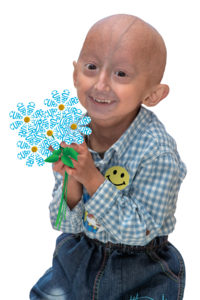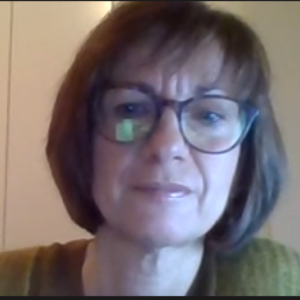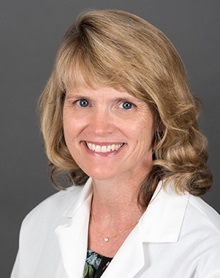ONEpossible 2021
Meet the Researchers
ONEpossible 2021
Growing Progeria Research: the KEY to the CURE!

PRF ‘plants the seeds of research’ in the most cutting-edge areas of science. With your help, we will cultivate the CURE! Thanks to our devoted community of donors, Progeria researchers are able to contribute to PRF’s tremendous progress toward treating, and one day CURING, children and young adults with Progeria. Here are just a few expressing why they’re so deeply committed.

“While all of us on the Boston Children’s Hospital (BCH) team are committed to science that underlies Progeria, we do it ALL for the kids! There is nothing more gratifying than being in clinical research, where we have the ability to weave together scientific principles and concepts and also meet these wonderful children and their families.”
“We are convinced that, as in many other diseases, a combination of drugs will be necessary for the cure. Finding the right combination requires a great effort of researchers – we and colleagues worldwide are working hard!”
“I’m forever grateful to be a part of a special team here at BCH…The work and effort that everyone has invested for these children, young adults, and their families, inspires me every day to continue pushing forward to find a cure. The resilience and strength that these kids and families demonstrate as they adapt to new and often unpredictable circumstances is extraordinary.”
“Every scientific discovery is like a party for these families. When Progeria was diagnosed for me, nothing was known about Progeria. So to think that now, we’re able to treat patients with drugs, it’s absolutely incredible […] and new families with young babies who have Progeria are not alone. They can be helped by the experiences of many different families, scientists and doctors who are working hard for us.”
“It’s inevitable that we will find a cure, eventually… we will never stop, and the people who join the Progeria family are in it for good.”
“Five years ago, we were still finishing the development of the very first base editor. If you had told me then that within five years, a single dose of a base editor could address Progeria in an animal at the DNA, RNA, protein, vascular pathology, and lifespan levels, I would have said ‘there’s no way.’ It’s a real testament to the dedication of the team that made this work possible.”
[With regard to the breakthrough findings in gene therapy studies]
“To see this dramatic response in our Progeria mouse model is one of the most exciting therapeutic developments I have been part of in 40 years as a physician-scientist.”
“I love being able to work with the children and their families who come to Boston Children’s Hospital for treatment. The most apparent similarity I have noticed about the children is that they don’t let the disease take control of their lives. If something is a challenge because of Progeria, they find a way to overcome it. The children are resilient, brave, and hopeful which is a true testament to their characters.”
Q&A with Giovanna Lattanzi, PhD, a molecular geneticist in Bologna, Italy.
 We are thrilled to feature one of PRF’s dedicated researchers, Giovanna Lattanzi, PhD, a molecular geneticist in Bologna, Italy. We asked Giovanna a few questions about the research she does and what it means to her. Here’s what she said:
We are thrilled to feature one of PRF’s dedicated researchers, Giovanna Lattanzi, PhD, a molecular geneticist in Bologna, Italy. We asked Giovanna a few questions about the research she does and what it means to her. Here’s what she said:
PRF: What led you to be interested in Progeria research?
Giovanna: My interest in Progeria research started in 2003, as soon as the LMNA mutation was linked to HGPS. I was already involved in LMNA research, studying several LMNA linked diseases that had been discovered from 1999 to 2002.
PRF: How is your work in Progeria research going?
Giovanna: Working in Progeria is exciting, as you see that each aspect of Progeria pathogenesis is linked to fundamental processes of our organism. Since we started working on Progeria, we understood many new biological mechanisms linking the mutated protein, lamin A, to cell development, adipose tissue metabolism and aging.
PRF: What are you most excited about with your research progress?
Giovanna: We are now more and more enthusiastic as we recently found that defects in stress response also leading to inflammatory reactions are at the basis of HGPS and, most importantly, can be counteracted by treatment with biological therapeutics.
PRF: What do you want the Progeria community to understand about where your research is headed?
Giovanna: Our research addresses a fundamental aspect of disease, the altered response of cells and tissues to stress, and we think that finding a modulator of stress response can provide an effective treatment. Moreover, we are convinced that, as in many other diseases, a combination of drugs will be necessary for the cure. Finding the right combination requires a great effort of researchers: we and colleagues worldwide are working hard! I wish to thank PRF for their great work with HGPS children and families, for the enthusiasm they share with researchers and for their support to our research.
Q&A with Dr. Catherine Gordon, Endocrinologist and Bone Health Specialist with Boston Children’s Hospital.
 Meet Dr. Catherine Gordon, Endocrinologist and Bone Health Specialist with Boston Children’s Hospital (BCH), who’s been an integral part of the Progeria Clinical Trial team at BCH for almost two decades. We asked her a few questions about her experience working with the children during their clinical trial visits and hope you enjoy reading her responses:
Meet Dr. Catherine Gordon, Endocrinologist and Bone Health Specialist with Boston Children’s Hospital (BCH), who’s been an integral part of the Progeria Clinical Trial team at BCH for almost two decades. We asked her a few questions about her experience working with the children during their clinical trial visits and hope you enjoy reading her responses:
PRF: What led you to be interested in this line of work?
Dr. G.: I had the good fortune of meeting Dr. Leslie Gordon about 20 years ago. I was inspired by her enthusiasm and desire to find a cure for children with Progeria. Leslie has a way of making every team member feel valued and got all of us enthusiastic about our important work in helping to improve the lives of these beautiful children.
PRF: What are you most excited about with these trials?
Dr. G.: It’s been amazing to see the multidisciplinary team that has been assembled, each of us focusing on a different aspect of health, and examining complementary health outcomes in affected children. It was particularly rewarding to be part of the first recognized treatment (now endorsed by FDA) to help prolong the lives of children with Progeria.
PRF: Is there anything you want the Progeria community to understand about the clinical trials?
Dr. G.: While all of us on the BCH team are committed to science that underlies Progeria, we do it ALL for the kids! There is nothing more gratifying than being in clinical research, where we have the ability to weave together scientific principles and concepts and also meet these wonderful children and their families. It “takes a village” to carry out a clinical trial, and each and every team member and their unique role on the team is important.
PRF: Would you like to add anything else?
Dr. G.: I appreciate the support of PRF in cheering us on and providing the vital funds that make our now long-term work possible.

